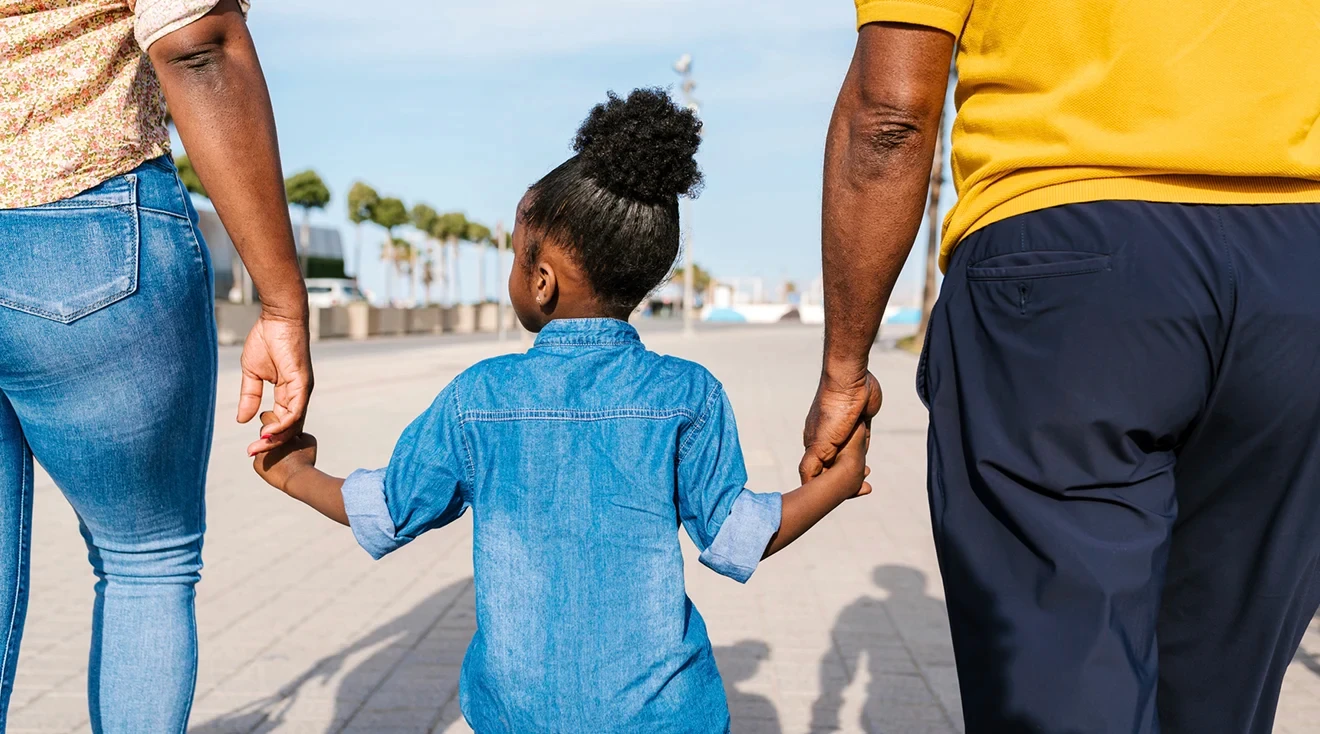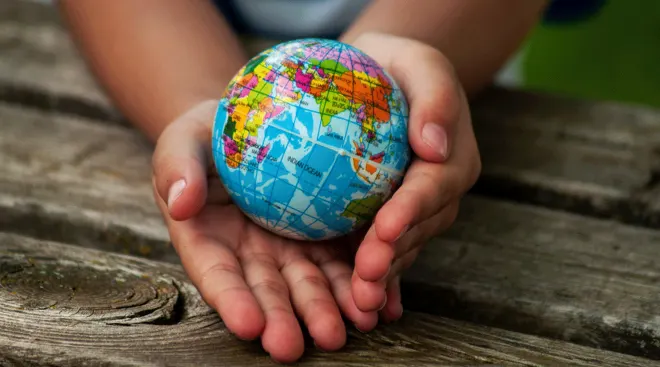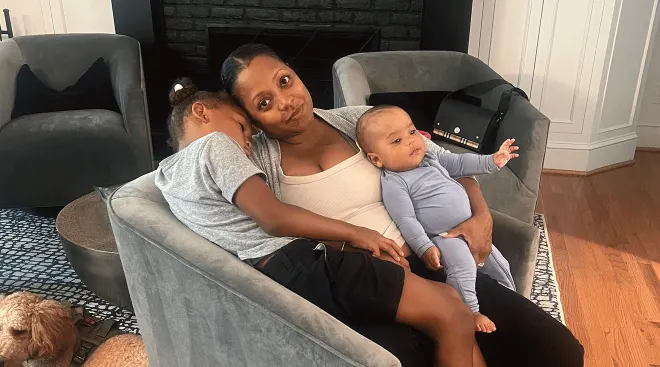How Generational Trauma Affects Black Families—and Ways to Work Toward Healing
I’ve seen generational trauma leave holes in our family narrative: More stories ended with “and they refused to tell anyone what happened” than I could count. Struggling in silence has hurt all of us, especially mothers and caregivers. Because I wanted better for myself and my children, I started working on a plan to parent from a place of self-awareness and freedom even before I was pregnant. But the truth is, all too often, generational trauma in Black families is nurtured by silence. To get to a place of healing for myself, I had to resist silence, seek support and reduce the pressure of perfection. Here’s what I learned.
Denise Brady, LMFT, a marriage and family therapist in Long Beach, California, says that generational trauma—also referred to as intergenerational, transgenerational or multigenerational trauma—refers to the experiences passed down from trauma survivors to their descendants. “People experiencing intergenerational trauma may experience symptoms, reactions, patterns, and emotional and psychological effects from trauma experienced by previous generations,” says Brady.
Generational trauma isn’t limited to Black families, but it’s evident in Black communities as generations of Black Americans have experienced centuries of anti-Black violence. This continuous harm has had a devastating impact on the mental health of Black communities. Research shows that 21 percent of Black American adults experience mental illness, but only 39 percent report receiving treatment. This is likely due to barriers such as low representation among Black mental health professionals, stigma and cost.
In my family, the silence I witnessed left loved ones pantomiming strength despite drowning in unaddressed struggles. It cost us apologies, reconciliation and validation. I didn’t always know that this commitment to the illusion of strength was a manifestation of generational trauma—one that can make it hard to connect with our children.
Brady notes that generational trauma can impact trust between loved ones and show up as anger, irritability, nightmares and fearfulness. Without access to care, many Black parents and caregivers are in survival mode in a world that’s actively harming us. “While we work on overcoming past traumatic wounds, we still have to exist in a world that’s currently causing us trauma,” Brady says.
Generational trauma leaves Black parents and caregivers anticipating the pain of the past and preparing our children for a less-than-ideal future, often in misguided ways. “We subconsciously parent through our wounded selves instead of our healed selves,” says Brady. “We know that our parents’ experiences make them who they are, and in turn, they make us who we are.”
Brandon Jones, MFT, executive director of the Minnesota Association for Children’s Mental Health and a mental health consultant specializing in intergenerational trauma, says generational trauma can impact parents, caregivers and families by causing mental health challenges, communication issues and relationship problems. He adds that signs generational trauma is impacting your parenting and family dynamics include avoidance, emotional numbing and hyperarousal, a symptom of post-traumatic stress disorder (PTSD) characterized by feelings of irritability and being easy to startle.
Healing generational trauma is a long journey—but it’s worth it. When I began to work toward breaking the cycle of generational trauma, I knew that unaddressed trauma could derail my dynamic with my children and loved ones—but I also knew my choice to heal would require intentional action and guidance. Here are a few things that helped me.
- Acknowledge the trauma. Raquel Martin, PhD, a licensed clinical psychologist in Nashville, Tennessee, who specializes in Black mental health, says that you don’t have to have experienced suffering firsthand to experience trauma. “You can also experience symptoms as a result of consistently being exposed to aversive details of an event,” she says, adding that racism can contribute to PTSD symptoms.
- Pinpoint your unaddressed needs. I knew I couldn’t heal from generational trauma without challenging the expectation to remain silent as I struggled. This meant recognizing that I had unmet needs, including support for generalized anxiety disorder and depression, that made my childhood harder. Martin says the first step is acknowledging unaddressed issues. “Discuss the contributing factors to the issue, such as communication difficulties or environmental struggles,” she says. “It can also be helpful to discuss times when there have been issues in the past.” She says it can also help to ask yourself questions like, “What did I get versus what did I need?” to identify solutions.
- Know the signs. Martin says it’s important to understand the signs that you’re experiencing mental health difficulties, such as low frustration tolerance. “Some people will make statements such as, ‘I can’t change’ or, ‘This is my personality,’ and to [them], I’d say anger and frustration are branches; there are roots that are driving those behaviors,” she says. “And it takes time to get to them. But you can’t grow until you do.”
- Be vulnerable and embrace imperfection. Brady says many parents hyperfocus on perfection and miss the chance to be present. “We lose focus on what our children need by beating ourselves up about our parental mistakes,” she says, noting there’s no one-size-fits-all for parenthood.
- Seek mental health support. Therapy was in my personal journey, but mental health support can take many forms. “It’s important to acknowledge the intergenerational trauma that may exist and to seek professional help where necessary,” says Jones. “Black parents and family members seeking practices to move toward healing themselves and their families can try therapy, self-care and community support.” Finding mental health help can be overwhelming, but there are many resources that offer support with Black families in mind, like Black Emotional and Mental Health Collective (BEAM) and social media pages like Decolonizing Therapy. When possible, having conversations with your children and other family members about your experience can also help with healing from generational trauma.
- Take care of yourself. “Don’t put pressure on yourself to be the generational cycle-breaker of your family,” says Brady. “Take breaks from your healing work and recognize as parents it’s healthy to need breaks and to prioritize our needs. It doesn’t make you a selfish parent. If anything, it makes you a better parent.” Personally, I’ve found that patience and compassion have been crucial throughout this process. “Be patient with yourself,” says Brady. “Remember to take time for yourself. If you are not taking care of yourself, then you cannot take care of your kids.”
There’s no magic fix to generational trauma, especially in a society built on anti-Blackness. But there’s healing and wholeness in speaking up about historical and systemic transgressions, and in taking care of yourself along the way. I haven’t had a linear healing journey, but I know my children learn from watching me. I also don’t take my freedom to parent from a place of authenticity for granted. Breaking the cycles of silence and sacrifice enables me to parent with mental clarity, challenge mental health concerns—and continue to heal.
Plus, more from The Bump:
Denise Brady, LMFT, is a marriage and family therapist in Long Beach, California, who has a passion for working with marginalized communities.
Brandon Jones, MFT, MA, CPPM, is the executive director of the Minnesota Association for Children’s Mental Health and a mental health consultant specializing in adverse childhood experiences and historical and intergenerational trauma.
Raquel Martin, PhD, is a clinical psychologist in Nashville, Tennessee, who specializes in Black mental health. She’s also an assistant professor at Tennessee State University.
Substance Abuse and Mental Health Services Administration, 2021 NSDUH Annual National Report, January 2023
Substance Abuse and Mental Health Services Administration, 2020 NSDUH Detailed Tables, January 2022
American Psychiatric Association, Diversity and Health Equity Education: African Americans
The Commonwealth Fund, Inequities in Health Insurance Coverage and Access for Black and Hispanic Adults, March 2023
Plos One, Posttraumatic Stress Disorder Hyperarousal Event Detection Using Smartwatch Physiological and Activity Data, May 2022
Navigate forward to interact with the calendar and select a date. Press the question mark key to get the keyboard shortcuts for changing dates.





















































